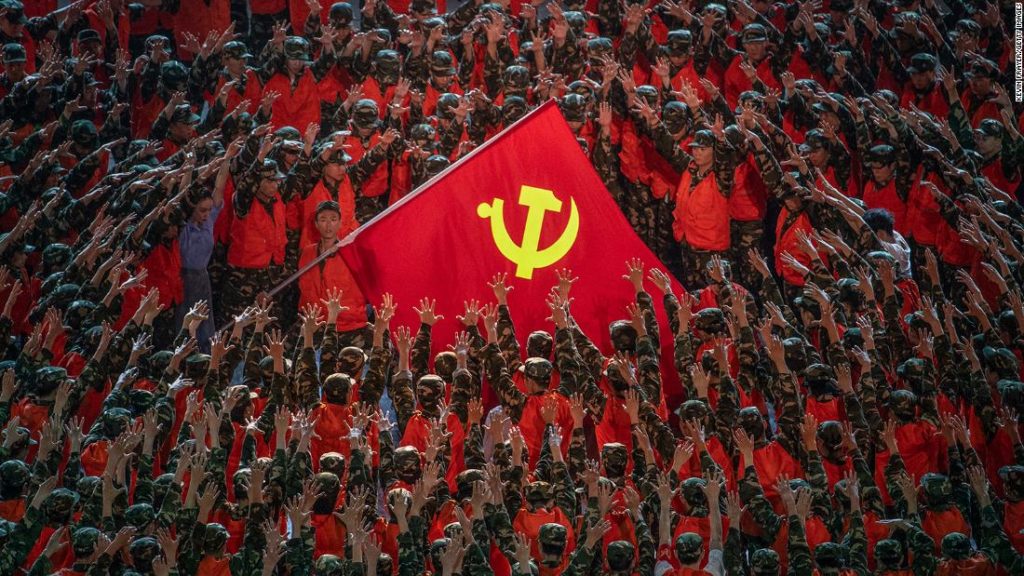One hundred years ago this July, in a small brick house in Shanghai’s former French Concession, Mao Zedong and around a dozen other delegates gathered together in secret to form a new political party.
But while the party has proven itself willing to adapt and change at crucial moments to ensure its survival (by way of comparison, the ruling party of the Soviet Union lasted 93 years before the collapse of the communist regime in 1991), it remains keenly aware of the risks it faces, from a slowing economy, an aging population and a shrinking workforce, to an increasingly united West that is determined to counter its rise.
“How do you prove that you are the legitimate government of China? You do so by putting on an enormous show to remind people of what you’ve given them. You’ve lifted them out of poverty, given them economic growth and restored China to a central place in the world,” Graeme Smith of the Australian National University told CNN in the run up to Thursday’s anniversary.
It’s likely that large parts of the day’s events will focus on Xi, arguably the country’s most powerful leader since Mao, and his vision for the country.
Under Xi, the party has consolidated its hold on key sectors and industries, while tightening its grip on daily life. As Xi himself said at the 17th Party Congress in 2017, “In the east, west, south, and north, the party leads everything.”
But while the party has much to celebrate, particularly China’s growth from one of the poorest nations in the world into an economy on the brink of overtaking the US, it has also been responsible for some of darkest chapters of the last century, including the brutal repression of student protestors in Tiananmen Square, the decade of mayhem under former Chairman Mao Zedong’s Cultural Revolution, and the millions who starved to death as a result of disastrous CCP economic policy decisions.
Such incidents are unlikely to feature in Thursday’s trip down memory lane, having long been played down or simply censored outright within China. But that doesn’t mean they will be forgotten.
Whether the party likes it or not, its 100th anniversary will also provide an opportunity for the world to reflect on an organization whose power and reach now extends far beyond its own borders.
The party’s influence inside global organizations, including the United Nations, the World Bank and the World Health Organization, is growing and many Western nations are heavily reliant on China for their economic growth.
Photo of the Day
China’s worst power shortage in a decade is a problem for the whole world
China is in the middle of a huge power crunch as extreme weather, surging demand for energy and strict limits on coal usage deliver a triple blow to the nation’s electricity grid. It’s a problem that could last for months, straining the country’s economic recovery and weighing on global trade.
Nearly a dozen Chinese provinces have said they are facing a power crunch in recent weeks, including some of the country’s most important engines for economic growth, such as Guangdong province. Orders for power rationing have forced companies across Guangdong to shut down for a few days per week. Some local authorities are warning that power rationing could last through the end of the year.
At least nine provinces have said they are dealing with similar issues in what is now the worst energy shortage in China since 2011, when droughts and surging coal prices pushed 17 provinces or regions to curb electricity use.
This time around, the post-pandemic commodities boom and severe weather are once again forcing coal power plants to curb output, while also hampering hydroelectricity. But there’s a key difference: China is also grappling with how to meet President Xi Jinping’s push for a carbon neutral China by 2060. That ambitious target for the world’s biggest coal consumer has led the country’s coal mines to produce less, resulting in higher prices, according to Yao Pei, chief strategist for Chinese brokerage firm Soochow Securities.
A nationwide safety check before the Communist Party’s 100th anniversary on Thursday has also led to massive suspensions of coal mines across China, exacerbating the strains on the coal supply.
— By Laura He
Around Asia
- It’s been a year since Beijing promulgated a sweeping national security law in Hong Kong. Many residents feel their worst fears have been confirmed as they watch the once-freewheeling city hit by previously unthinkable crackdown measures at a dizzying speed.
- Pakistani expatriate workers, desperate to receive a shot of the Pfizer-BioNTech or AstraZeneca Covid-19 vaccine so they can travel to work in Saudi Arabia, stormed a vaccination center in Islamabad on Monday, witnesses said.
- Myanmar’s military has such strong control over the country’s jade trade that it would be “nearly impossible” to buy the gemstone without enriching the generals and their allies, a new report said Tuesday.
- Japan’s deputy defense minister on Monday warned of the growing threat posed by Chinese and Russian collaboration and said it was necessary to “wake up” to Beijing’s pressure on Taiwan and protect the island “as a democratic country.”
You may also like
-
Afghanistan: Civilian casualties hit record high amid US withdrawal, UN says
-
How Taiwan is trying to defend against a cyber ‘World War III’
-
Pandemic travel news this week: Quarantine escapes and airplane disguises
-
Why would anyone trust Brexit Britain again?
-
Black fungus: A second crisis is killing survivors of India’s worst Covid wave

